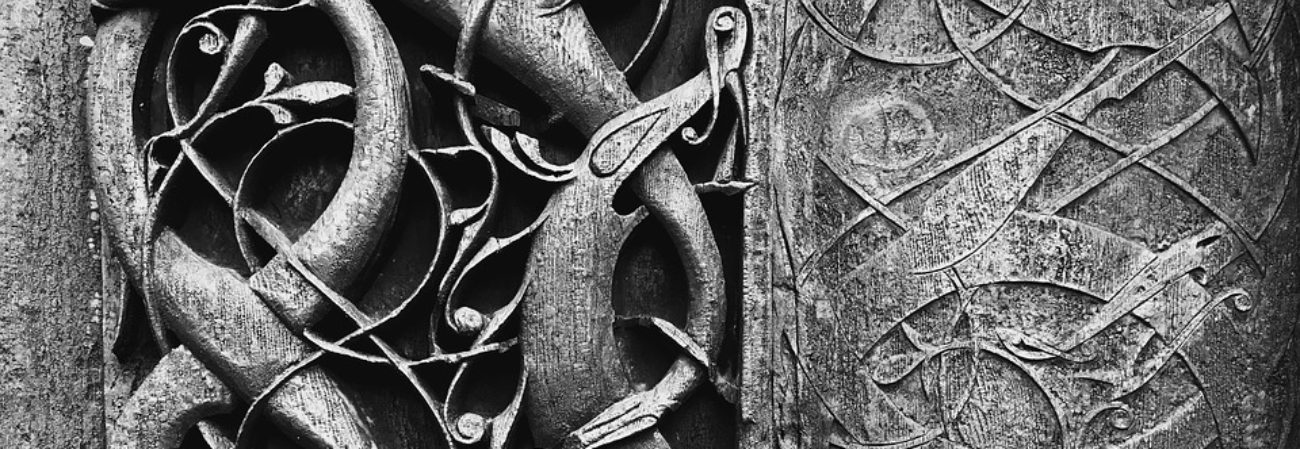
Yes. It has been a long time. It has been a busy summer and when I have had writing time, I have devoted it to my third novel The Bone Goddess, or on research.
My research has taken me down many pathways. One of the recent pathways has been learning about writing as it pertains to the culture of the Rus in the time period about which I am writing.
In The Bone Goddess, Rastislav is a former volkhv – a Slavic pagan priest or magician – and a recent convert to Christianity. He wishes to learn to train to be a monk in Novgorod. Even this more minor aspect of the story led me down an interesting rabbit-hole of research.
Rastislav hesitated. “I have seen the ruthless retaliation of Dobrynya and I fear for those at home. That he may turn his attention next to them.”
Now it was Nicetas’ turn to sigh. “Rastislav, even though you are convinced that your people are being persecuted for their faith, you must remember that the men and women you saw hanged on that wall, were hanged for inciting rebellion, and for murder in their role in the deaths of Dobrynya’s family. As long as the people you speak of have done nothing to incite rebellion and violence against their rulers, I do not see why you should fear for them. If you must go to see to their welfare, then go. But I should hate to see you interrupt your studies now when you have been doing so well. If you can finally learn to let go of your heathenish leanings, we might make a proper monastic of you yet.”
Rastislav sat on the rain-slick log next to Father Nicetas. Ignoring how the damp soaked through his clothes, he clasped his hands together and looked at them in silence. “You are right, Father. I should not be so hasty.”
“Very well then. I do believe there is still some copying to do from the Gospel of Saint John. I have some freshly prepared ink. But I think you would do better to ply your chicken scratches on birchbark as yet. Bring a little water from the spring and I shall make an infusion of mugwort. It does well for mental clarity and focus, which I think you need much of, Rastislav.”
To a young neophyte like Rastislav, birchbark would have been a readily available resource for practicing writing on or copying down the gospels and Psalter in order to commit them to memory.
Simon Franklin writes in his Writing, Society and Culture in Early Rus c. 950-1300 “Birch bark was primarily (though not exclusively) a medium associated with economic activities in the urban community.”
A case in point is the following example from the middle of the 14th century.
Here, Yakov has settled with Gyurgiy and with Khartitonvby courtless deed Gyurgiy has gotten [at court] concerning trampled [by horses] wheat and Khariton concerning his loss. Gyurgiy got one rouble [money], three grivnas [money], and basket [measure] of wheat for all that, and Khariton got ten cubits of cloth and one grivna. And Gyurgiy and Khariton have no more concern to Yakov, nor Yakov to Gyurgiy and Khariton. And arrangers and perceivers to that are Davyd, son of Luka, and Stepan Taishin.
Some are poignant and touching with at least one being a letter from one lover to another. Still another one, pictured below could be the scrawl of any child today.

Birch bark was easily procured and cheap. Franklin further elaborated the common preparation of birchbark for writing: “To prepare birchbark for writing, the coarse layers were stripped away to leave a smooth, flexible strip which then perhaps was soaked or boiled for additional elasticity. Letter were scored on the inner – and softer – surface with a sharp-pointed stylus of metal, wood or bone.”
Parchment, by contrast, was far more expensive and laborious to produce. The parchment for a modest sized book would be prepared from as many as half a dozen calf skins.
As many things as you can think of to scribble on a notepad today, were scribbled on the Novgorodian birchbarks. Sermons, prayers, jokes, school lessons, and household advice. Wills, receipts, deeds etcetera were also written on birchbark. Thousands of these documents have been unearthed, not just at Novgorod, but throughout Russia and the Ukraine.
These documents have survived largely due to the nature of the clay soil they were found in that prevented oxygen from reaching them. Thanks to this and the tireless efforts of archaeologists, we have a peek into the past through the eyes of the men and women of Novgorod.
